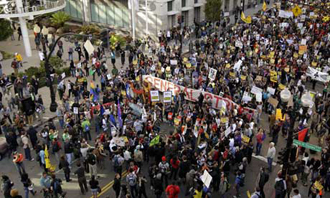Through no fault of her own Oakland Mayor Jean Quan has become a lightning rod for anger over conditions that she has probably done less to create than virtually any politician in the nation.
The stage was set for her global scapegoat moment last Monday with the filing of a recall petition by a small group claiming that Quan has done nothing to make Oakland safer. Somewhat emblematic of Oakland’s safety issues are the homeless people who camp out on Frank Ogawa Plaza smack dab in the heart of city’s downtown area.
Last Tuesday morning the Plaza became the stage for a peaceful protest rally by Occupy Oakland, the local franchise of the Occupy Wall Street movement that has gone global. After a morning of protests the crowd peacefully cleared out of the Plaza without violent incidents. That evening they returned. For some reason only she knows, Quan ordered the police to clear them out. The police were aggressive, firing tear-gas grenades and rubber bullets. One of their rounds seems to have hit the head of a protester named Scott Olsen, fracturing his skull.
Olsen happened to be a wounded Marine veteran of the Iraq War. That fact supplied a compelling enough angle for the national media to plaster the story on the front pages. Iraq War Vet Shot at Occupy Oakland Protest. The connection between the Iraq War and Occupy Wall Street is spurious but, boy, what a nice hook for what would otherwise have been another humdrum local iteration of the countless Occupy Wall Street rallies held around the world.
By last Wednesday what happened in Oakland had become world news. Talking heads who had never even heard of Jean Quan were calling for her to step down.
The situation was enough to befuddle anyone, especially a woman who had spent her adult life working at the grassroots level on the school board and the city council to improve a decaying city before beginning her mayoral term in January. To the extent that her record can be related to the systemic failure that prompted the Occupy Wall Street movement, it would be in complete alignment with the movement’s efforts to focus government attention on the plight of the 99% who have been run down by the freight train of over-leveraged speculation driven by the 1%.
The mass media spotlight made Quan out to be a callous authority figure who let terrible things happen to good people while protecting capitalist interests. This Tuesday she was booed off the stage at the Frank Ogawa Plaza when she tried to address the Occupy Oakland crowd. Quan retreated to her office across the street and recorded a Facebook video message taking responsibility for Olsen’s fractured skull and apologizing for it.
Then on Wednesday — Occupy Oakland’s Day of Action — Quan began showing her befuddlement by giving permission for city employees to participate in the rally while simultaneously ordering all off-duty police officers to report for duty. This mixed message prompted Howard Jordan — apparently the police chief from hell — to complain publicly about the confusion Quan was causing his department.
Wednesday’s rally began peacefully. At 4 p.m. the demonstrators shut down much of the operations of the Port of Oakland in their symbolic assault on the capitalist system. The day’s only violence occurred when a group of youth described by the police chief as “anarchists” vandalized a Whole Foods storefront and broke windows and ATMs of Bank of America and Wells Fargo banks.
At midnight after most of the protesters had already gone home Jordan’s police officers went on another apparently unnecessary offensive, firing tear gas and flash bangs in an apparent effort at herding the few remaining protesters back onto Frank Ogawa Plaza. Apparently the Plaza has now become a designated safe haven for protesters and others.
Thanks to jumpy Jordan one man was shot in the leg by a rubber bullet and carried away to a hospital. Another protester was hit by a car though that may have had nothing to do with the police force. Neither are the kind of injuries likely to land Jean Quan on the world’s front pages, but her big scapegoat moment probably isn’t over. Occupy Oakland is vowing to stage more protests, any one of which could once again put her between the rock of preserving the peace and the hard place of showing sympathy with the people she has always tried to serve.
Regardless of which way Quan ends up erring, what matters is that she hang onto her guts and conviction — the only qualities that win points for public officials in similar predicaments.
Four decades ago SI Hayakawa found himself in a situation similar as Quan’s though he was on the opposite pole politically. While Hayakawa was president of San Francisco State University, the campus was disrupted by a series of progressively more raucous radical student demonstrations. The situation could have involved violent melees between police and demonstrators. Instead Hayakawa earned the admiration of conservatives and moderates by disrupting a large student rally by pulling the wires out from the speakers on a van. That act of gutsy moral indignation elevated an obscure semanticist and college administrator to the national political stage. In 1976 he won a U.S. Senate seat from California against incumbent John Tunney.

